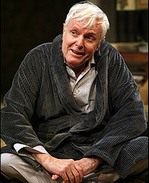SITE GUIDE
SEARCH
REVIEWS
REVIEW ARCHIVES
ADVERTISING AT CURTAINUP
FEATURES
NEWS
Etcetera and
Short Term Listings
LISTINGS
Broadway
Off-Broadway
NYC Restaurants
BOOKS and CDs
OTHER PLACES
Berkshires
London
California
New Jersey
Philadelphia
Elsewhere
QUOTES
TKTS
PLAYWRIGHTS' ALBUMS
LETTERS TO EDITOR
FILM
LINKS
MISCELLANEOUS
Free Updates
Masthead
A CurtainUp Review
Saturn Returns
By† Simon† Saltzman
|
Do you see them? — Suzanne † Iím not crazy. Not yet anyway. There are echoes. Do you know what I mean? They were here. And then they werenít. And I have to stay here. Because this is where they were. — Gustav (at 88) |

John McMartin in Saturn Returns
(Photo: Joan Marcus)
|
The returns were obviously not too kind to the sad and lonely Gustin (John McMartin), the 88 year-old retired radiologist who lives alone in his neglected old mansion in Grand Rapids, Michigan. White haired, bespectacled and wearing a robe, he wanders around while visited with disquieting regularity by his long-deceased wife Loretta and daughter Zephyr and by what he calls "echoes," of himself at 58 and 28. Charles Dickens would love this.
Despite some light touches that suggest Gustinís bent for comical perversity, sadness overwhelms the atmosphere. The play offers us glimpses of the life-altering moments that have shifted and shaped Gustinís life. Haigleís dramatic device by which these moments are brought into sharp relief is accomplished with a sensitive and also crafty ingenuity. Nicholas Martinís direction is quietly arresting and can take credit for the fluidly devised, gimmick-free transitions. These are enhanced by some lovely original music by Mark Bennett.
At the start of the play, Gustin is cheery and a bit spunky with Suzanne (Rosie Benton), the attractive and conciliatory visiting home care professional who not only takes his vitals but also is persuaded to stay and fix his breakfast. Gustin is soon energized by Suzanne who triggers Gustinís memory of his 30 year-old daughter Zephyr (also played by Benton) who drowned while on a holiday in Mexico. A number of scenes explore their relationship, particularly his dependence on her after the death of Loretta in childbirth. In one of the playís most persuasive and amusing scenes, Zephyr tries to get her father to be enthusiastic about dating. Benton also plays Loretta, the young, emotionally needy young wife ("Kiss me like weíre happy,"). In the almost poetically embroidered scenes between Gustin and Loretta, we are aware of them speaking to each other in the third person. In that Benton portrays all the women, it becomes the playís most cleverly devised aspect.
The play takes place within designer Ralph Funicelloís handsomely furnished living room setting. Robert Eli portrays Gustin as the 28 year-old medical student and James Rebhorn takes over as Gustin at 58. Eli and Rebhorn are both splendid, and especially winning in the way they repeat Gustinís behavioral idiosyncrasies, such as preferring the floor over a chair for lounging. In particular, Rebhorn captures the cadence and rhythm of McMartinís speech. McMartin does the almost impossible by making Gustinís often disaffecting and disagreeable nature rather endearing.
The challenge that confronts director Martin is how to make Gustinís memories resonate with urgency. Although all the women are affectingly and distinctively portrayed by Benton, their motivations are often vague and diffused by their brevity. Isnít there more that we need to know about Lorettaís emotional insecurity, instability and a marriage that seems to be rooted more in fantasy than reality? What really fuels Zephyrís decision to leave home suddenly at the age of 30 other than realizing that it was about time for an adult of her age? There is also a sudden and puzzling denouement regarding Suzanne that comes out of nowhere. Granted the play has to end somewhere, but is it enough that we respect Gustinís desire to remain in the house with the resident ghosts he has become accustomed to rather than live out the rest of his life with strangers in a retirement community?
Despite my rather sour memory of Haidleís previous play Mr. Marmalade, I am inclined to regard Saturn Returns as a bittersweet elegy told in the light of planetary orbits and from the position of the stars. But we might well also consider (with apologies to the Bard) that "The fault, dear Gustin is not in our stars, but in ourselves, that we are underlings."
Links to other Haidle plays reviewed at curtainup.com
Mr. Marmalade
Rag and Bone
Vigils
|
Saturn Returns † By Noah Haidle † Directed by Nicholas Martin Cast: Rosie Benton (Suzanne/Zephyr/Loretta), John McMartin (Gustin Novak at 88), Robert Eli (Gustin at 28) and James Rebhorn (Gustin at 58). † Setting: Ralph Funicello † Costumes Robert Morgan † Lighting: Peter Kaczorowski † Original Music and Sound: Mark Bennett † Running Time 1 hour 15 minutes no intermission † Lincoln Center Theatre at the Mitzi Newhouse Theatre, 150 West 65th Street. (212) 239 Ė 6200 † Tickets ($65) Performances: Tuesday through Saturday evenings at 8 PM, with matinees Wednesday and Saturdays at 2 PM and Sundays at 3 PM. † Opened 11/10/08 Limited Run † Review by Simon Saltzman based on performance 11/12/08 |
|
REVIEW FEEDBACK Highlight one of the responses below and click "copy" or"CTRL+C"
Paste the highlighted text into the subject line (CTRL+ V): Feel free to add detailed comments in the body of the email. |






